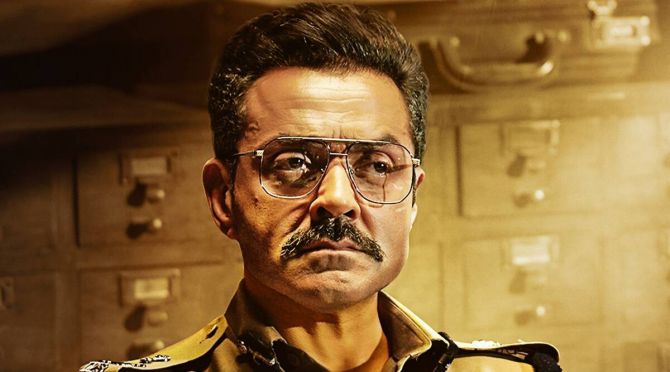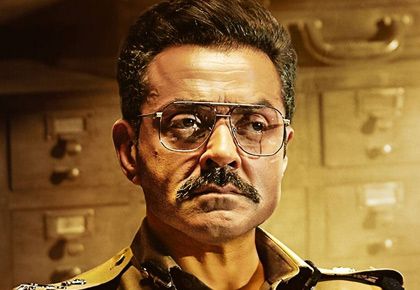Class of '83 is no Ardh Satya and Bobby Deol is no Om Puri, notes Sukanya Verma.

Atul Sabharwal's stories let on a fascination for the role of environment and experiences in shaping a man's virtues.
If Aurangzeb's family drama explored the impact of conditioning on conscience against the backdrop of crime and corruption, the cop drama Class of '83 is curious to test if flouting rules is a practical option for keepers of law and order in the name of ethics while compromising on their own.
Like Aurangzeb, it too begins with a quote from an ancient philosopher, here Plato, signifying the essence of his premise: 'Good people do not need laws to tell them to act responsibly, while bad people will find a way around the laws.'
As curious these morality musings are, Class of '83 unevenly engages for want of dynamism and volatility despite all the material at its disposal.
Sabharwal's dreary treatment of S Hussain Zaidi's book, The Class of '83: The Punishers of Mumbai Police becomes all the more conspicuous in Viju Shah's synthesiser-loving background score.
Neither the performers nor their weakly projected motivations match the vigour of his tunes punctuating every moment of its rambling account.
A lacklustre voiceover guides us through the pages of what sounds like a diary whose several pages have gone missing while its heavily sepia tinted frames draw attention to its khaki populated atmosphere.
At a training school for cops in Nashik, five errant cadets (Hitesh Bhojraj, Bhupendra Jadawat, Sameer Paranjape, Ninad Mahajani, Prithvik Pratap) capture a dean's fancy.
Bobby Deol is Vijay Singh, sporting a moustache and blank face for stoic effect.
Flashes from his personal life -- a dead wife, an estranged son -- offer some vague explanation for his emotionally unavailable, workaholic guilt.
It is the early 1980s, where ladoos are distributed on learning of landline connections and entitled good-for-nothing learners bid time by conspiring to teach their disciplinarian teacher a lesson.
Just as you presume the movie is building towards something promising in how cadets are encouraged to think on their feet alongside the dean's intention to turn them into corruption-tackling antibodies, the schooling is cut short to jump directly in 1983 Mumbai.
A wall of four movie posters from the year of Hero, Jaane Bhi Do Yaaro, Justice Chaudhary and Nastik at a bus stop almost reads like options laid out before the boys at the beginning of their career.
But 1983 is also the year of Ardh Satya, also about Om Puri's fiery cop fighting his own battle against corruption and 'chakravyuhs'.
Class of '83 is devoid of any such angst.
Between the designed encounters and police-politician nexus, the capitalist economy threatening Socialist propaganda, mills and mafia, Sabharwal's scattered screenplay cannot decide how to turn all the information at hand into a cohesive plan and persuasive characterisation.
One gets a sense of Sabharwal's desire to show Bombay before it became Mumbai in a transitional phase but Class of '83 gets so preoccupied in yammering its knowledge of the city's history, the punch never lands.
Instead, the plot veers off to tell contrived episodes of dishonesty, rivalry and sacrifice until the rookie protagonists acquire a renewed sense of justice. But it is the idea of revenge, not dedication for duty, that defines their actions.
Has the Dean created Frankenstein? Or is it the inescapable irony of playing good cop bad cop that Class of ’83 is trying to show? I wasn’t sure what exactly the movie wants to convey.
The dean is a sly, shrewd tough guy played with machine-like precision by Deol.
When an interesting, digressing, moment arrives, where it seems as though Sabharwal has broken into a chain of thoughts over Bollywood's obsession of profit over quality in his ramblings on the mediocre 50 to 100 crore and somehow likening it to a mentor's disappointment in his protegees, Deol's limitations show.
He has been built into this formidable figure, but does nothing to live up to the hype. And its absurdly rushed climax stamps and seals this view.
In comparison, the newcomers exhibit far more ease, but don't get meat to chew on.
At the end of its little less than two hours duration, Class of '83 doesn't even pretend it is in unexplored territory.
It is like the bad guy tells the good guy, 'You, me, we are all disposable.'
The camera focuses on the good guy, Viju Shah's music pumps up, nothing happens and he leaves.
He has been there. He has done that.
Class of '83 streams on Netflix.













 © 2025
© 2025